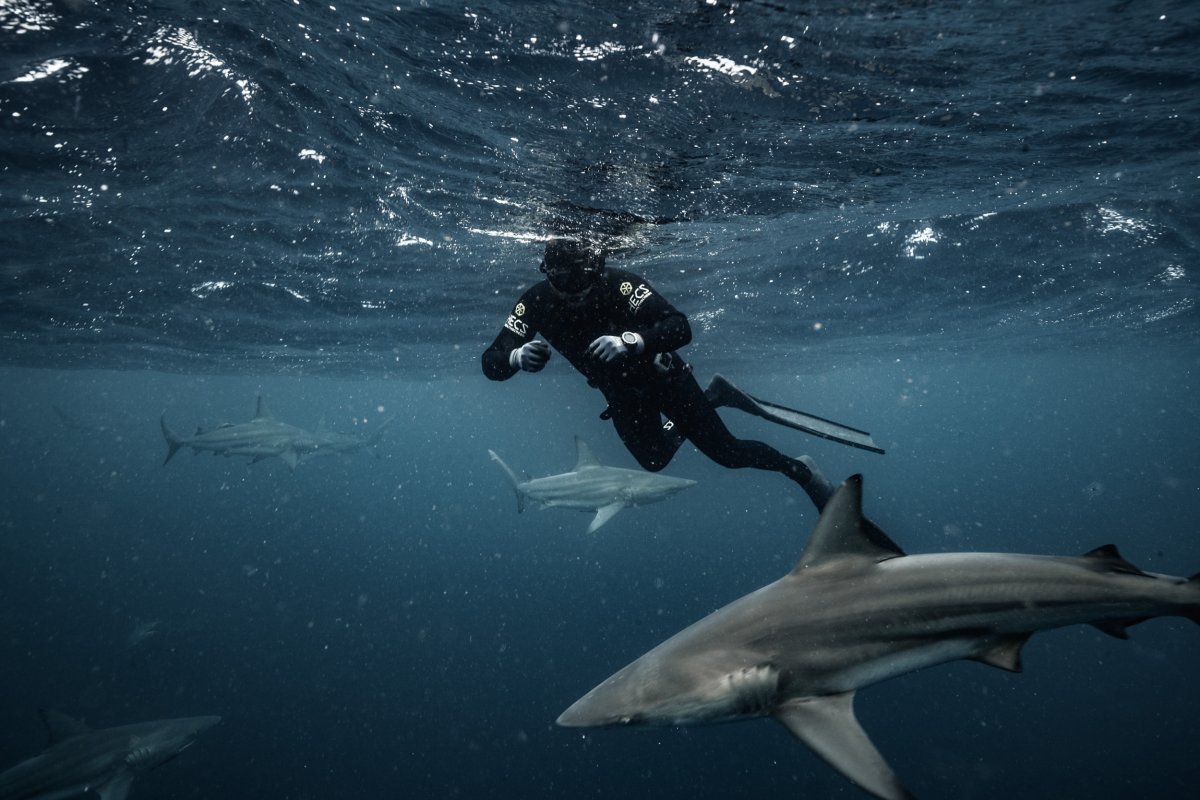A shark lost to science for nearly 120 years has been rediscovered off the coast of South Africa, wildlife biologist and TV presenter Forrest Galante said.
An upcoming documentary entitled Extinct or Alive: Land of the Lost Sharks—part of Discovery's "Shark Week"—features footage of the animal, the flapnose houndshark, as well as two other lost species, the whitetip weasel shark and ornate sleeper-ray.
Galante has made a career out of searching for species that are on the brink of extinction. For his latest film, he decided to head to the eastern coast of South Africa where over a third of the world's shark species converge.
"I knew South Africa had a number of lost species. Long story short, we thought if we go to this region, who knows, maybe we'll get lucky and find one. It turns out, we found a bunch, which was mind-blowing," Galante told Newsweek.
One of the rare sharks the team found, the flapnose houndshark (Scylliogaleus quecketti) has been lost to science for 120 years meaning the scientific world didn't really know if it had gone extinct, according to Galante.
"I started reaching out to peoples from fishing clubs and groups and started showing them pictures of these sharks. And sure enough, one out of every hundred guys would be like, 'I think I caught one of those five years ago.'"
Eventually, Galante and his team narrowed down areas where fishermen said they had previously caught the shark and decided to try and nab one for themselves. Remarkably, after two nights of fishing in the target areas, Galante and his team—which included one of the world's foremost shark experts Dave Ebert—managed to catch an individual flapnose houndshark measuring less than four feet in length.
"I was shocked, absolutely shocked," Galante said. "I was literally physically holding this lost animal in my hands, this animal that science hadn't been seen for 120 years. I get goose bumps just thinking about it. It's hard to explain what that feeling is like when your entire life's work is dedicated to finding things like this.
"It's like being a jewel thief and robbing the crown. You're holding this precious thing in your hand and it's such an overwhelming feeling. It's really hard to articulate."
Galante said the shark was out of the water for about "five seconds" in total before he placed it in a bucket filled with water that he had ready next to him. The team then took some measurements of the shark and fitted it with a monitoring device to track its movements before releasing the animal back into the ocean.

While catching the animal using this method likely caused the shark pain, Galante said the conservation benefits outweigh the risks involved.
"I don't want to lie to you and say no they don't feel it, they do, you're dragging them out of the water by their mouth. Now that being said, this is a benthic animal meaning ground-dwelling. It's very tough, it's very rugged, it lives in the surf zone. It's used to being banged around by the waves.
"You have to weigh what's the greater good: is it the risk of catching one animal to unlock all of these conservation dollars, this education, these resources, or do you ignore it? The obvious answer—the greater good is to try and find this animal. And of course, we take every single single safety protocol precaution we can."
Data from the tracking device—the first ever from this species—suggests that the animal survived and is "perfectly healthy," according to Galante. Furthermore, the data also revealed fascinating insights into this shark, which is named for the bizarre flaps under its nose.
"The theory that Dave and I had, along with a couple of the South African scientists that we've spoken to and collaborated with since, is that those animals actually aren't particularly rare. They're just endemic to such a small region. There's probably a high population of them in a very, very small area but that's it. So unless you happen to be looking right in that tiny little pocket, you'd never see one."
"The animal is vulnerable to extinction for sure because of its small habitat, but I don't actually think it's particularly rare."
During the making of the documentary, Galante and his team managed to capture video footage of the whitetip weasel shark, which the presenter said has not been since 1984. Furthermore, the program features footage of ornate sleeper-ray captured by a South African dive master Adrian Peartan. This spectacular electric stingray had not been documented since 2007, according to Galante.
Extinct or Alive: Land of the Lost Sharks airs on Tuesday, August 11 at 8 p.m. ET on Discovery Channel.
Uncommon Knowledge
Newsweek is committed to challenging conventional wisdom and finding connections in the search for common ground.
Newsweek is committed to challenging conventional wisdom and finding connections in the search for common ground.
About the writer
Aristos is a Newsweek science reporter with the London, U.K., bureau. He reports on science and health topics, including; animal, ... Read more
To read how Newsweek uses AI as a newsroom tool, Click here.








